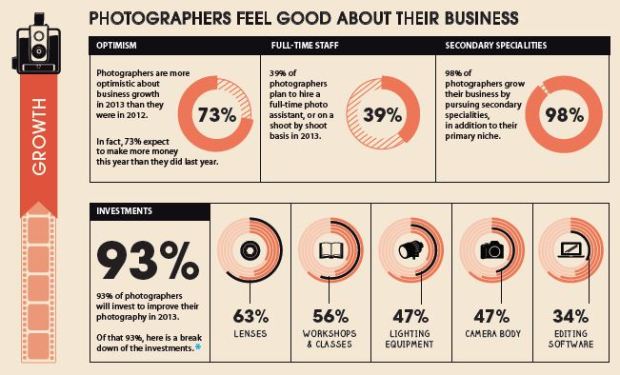This week, I came across a great infographic and survey by web-hosting provider Photoshelter, where 5,000 photographers gave their outlook on photography in 2013.
I’ve been following Photoshelter for several years, and I really love what they do for photographers. Building a website can be an expensive, complicated process, and Photoshelter takes away much of that hassle for what I think is a really reasonable price. They enable you to create stunning websites, while providing a wealth of resources to help you optimise your site and generate more traffic and leads. Who doesn’t want more leads? Anyway, back to the survey…
Optimism is high but there is a need to pursue additional specialities
The survey showed that 73% of photographers are optimistic about this year, and expected to make more money than last year. Happy days!
Interestingly, 98% of photographers grow their business by pursuing secondary specialities in addition to their primary niche. So perhaps for example, you can’t focus on just wedding photography alone – you may have to expand into portrait work to ensure you keep bookings up. Similarly, you may decide to add photography tuition or books and calendars to your product offering to supplement the income you derive from your primary specialty.
We love our gear!
As I (very impatiently) await the arrival of my new Canon 100mm f/2.8L macro lens, I could relate when I read that 93% of photographers will invest in 2013 to improve their photography. New gear is high on our list – 63% will invest in lenses, 47% in lighting, 47% in camera bodies and 34% in editing software. We’re a keen bunch of learners too, with 56% investing in workshops and classes.
On the gear front, just remember that new gear doesn’t translate directly into revenue – and one of the most frequent reasons small businesses fail, is their failure to contain costs. Just sayin’…
What marketing techniques are working for photographers?
The survey reported that 54% of photographers found that word of mouth was the best channel for finding new clients. The secret to word of mouth referrals is that you have to talk about your business. A lot. And you have to deliver great stuff! You have to leave your clients with a great impression of you and ultimately deliver awesome photography services to them. If your photos are great but service is questionable, their entire experience of you may be tarnished. If you go out of your way, every time, to provide both a quality product and service, and your clients tell you that you’ve done a great job, ASK them to tell their friends. Often.
25% of photogs reported that social media has been the best marketing channel for finding new clients, followed by the 21% who said that in-person meetings worked for them. Much of this will depend on what type of photography services you offer. Corporate photographers for example, may have more success requesting face-to-face meetings with PR and marketing representatives in companies to secure Annual Report photography work, than say trying to target them via social media. That said, social media is free, so why not try both strategies?
Not surprisingly, about half the respondents said their presence on social media had bought in new business for them.
What challenges do photographers face?
Given that it’s something most businesses face, it’s not surprising that about three quarters of photographers said that “finding new clients” was a challenge. The next biggest challenge, reported by half of the respondents, was getting found online. In today’s online world, I think those two challenges are related. Word of mouth happens online (and in person). Facebook, Pinterest, Flickr, Instagram and any of the other social media platforms make sharing content so easy with our social networks, that it’s logical you need a solid online presence (ie, website) and some form of a social media strategy.
I plan to write future posts about how websites and social media are critical marketing tools for any business owners, particularly photographers. In the meantime, I encourage you to download the full report and see what else the 5,000 photographers had to say about 2013.






Recent Comments